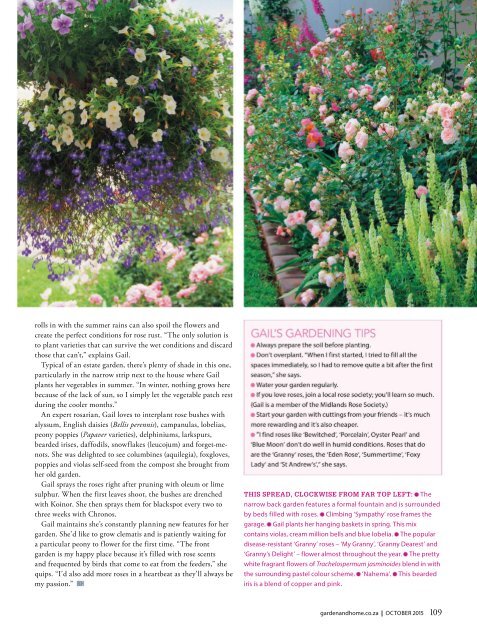Garden and Home South Africa - October 2015
- No tags were found...
You also want an ePaper? Increase the reach of your titles
YUMPU automatically turns print PDFs into web optimized ePapers that Google loves.
olls in with the summer rains can also spoil the flowers <strong>and</strong><br />
create the perfect conditions for rose rust. “The only solution is<br />
to plant varieties that can survive the wet conditions <strong>and</strong> discard<br />
those that can’t,” explains Gail.<br />
Typical of an estate garden, there’s plenty of shade in this one,<br />
particularly in the narrow strip next to the house where Gail<br />
plants her vegetables in summer. “In winter, nothing grows here<br />
because of the lack of sun, so I simply let the vegetable patch rest<br />
during the cooler months.”<br />
An expert rosarian, Gail loves to interplant rose bushes with<br />
alyssum, English daisies (Bellis perennis), campanulas, lobelias,<br />
peony poppies (Papaver varieties), delphiniums, larkspurs,<br />
bearded irises, daffodils, snowflakes (leucojum) <strong>and</strong> forget-menots.<br />
She was delighted to see columbines (aquilegia), foxgloves,<br />
poppies <strong>and</strong> violas self-seed from the compost she brought from<br />
her old garden.<br />
Gail sprays the roses right after pruning with oleum or lime<br />
sulphur. When the first leaves shoot, the bushes are drenched<br />
with Koinor. She then sprays them for blackspot every two to<br />
three weeks with Chronos.<br />
Gail maintains she’s constantly planning new features for her<br />
garden. She’d like to grow clematis <strong>and</strong> is patiently waiting for<br />
a particular peony to flower for the first time. “The front<br />
garden is my happy place because it’s filled with rose scents<br />
<strong>and</strong> frequented by birds that come to eat from the feeders,” she<br />
quips. “I’d also add more roses in a heartbeat as they’ll always be<br />
my passion.”<br />
GAIL’S GARDENING TIPS<br />
Always prepare the soil before planting.<br />
Don’t overplant. “When I first started, I tried to fill all the<br />
spaces immediately, so I had to remove quite a bit after the first<br />
season,” she says.<br />
Water your garden regularly.<br />
If you love roses, join a local rose society; you’ll learn so much.<br />
(Gail is a member of the Midl<strong>and</strong>s Rose Society.)<br />
Start your garden with cuttings from your friends – it’s much<br />
more rewarding <strong>and</strong> it’s also cheaper.<br />
“I find roses like ‘Bewitched’, ‘Porcelain’, Oyster Pearl’ <strong>and</strong><br />
‘Blue Moon’ don’t do well in humid conditions. Roses that do<br />
are the ‘Granny’ roses, the ‘Eden Rose’, ‘Summertime’, ‘Foxy<br />
Lady’ <strong>and</strong> ‘St Andrew’s’,” she says.<br />
THIS SPREAD, CLOCKWISE FROM FAR TOP LEFT: The<br />
narrow back garden features a formal fountain <strong>and</strong> is surrounded<br />
by beds filled with roses. Climbing ‘Sympathy’ rose frames the<br />
garage. Gail plants her hanging baskets in spring. This mix<br />
contains violas, cream million bells <strong>and</strong> blue lobelia. The popular<br />
disease-resistant ‘Granny’ roses – ‘My Granny’, ‘Granny Dearest’ <strong>and</strong><br />
‘Granny’s Delight’ – flower almost throughout the year. The pretty<br />
white fragrant flowers of Trachelospermum jasminoides blend in with<br />
the surrounding pastel colour scheme. ‘Nahema’. This bearded<br />
iris is a blend of copper <strong>and</strong> pink.<br />
garden<strong>and</strong>home.co.za | OCTOBER <strong>2015</strong> 109
















